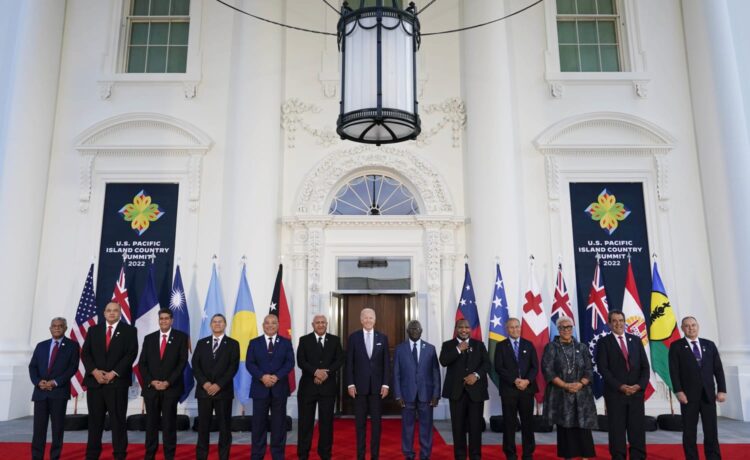HONG KONG — The budget impasse in Congress has further delayed crucial funding for three U.S.-allied Pacific Island nations, potentially making them more susceptible to influence by China, including over Taiwan, their leaders have warned.
Palau, the Marshall Islands and the Federated States of Micronesia are former U.S.-administered trust territories that are now independent states and maintain close U.S. ties through agreements known as Compacts of Free Association (COFA).
In exchange for economic assistance and defense guarantees, the three countries give Washington exclusive military access to an area of the Pacific that is bigger than the continental United States, at a time when the U.S. and China are competing for dominance in the strategically vital region.
The security compacts were successfully renewed for another 20 years last May and were supposed to be implemented Oct. 1. But, months later, despite bipartisan support, the $7.1 billion in funding has yet to be approved by Congress.
The delay “has generated uncertainty among our peoples,” the leaders of Palau, the Marshall Islands and the Federated States of Micronesia said in a joint letter this month that was sent to multiple senators, and “resulted in undesirable opportunities for economic exploitation by competitive political actors active in the Pacific.”
Congress has been mired in disputes over an emergency supplemental budget request that includes assistance for Israel, Ukraine and the Beijing-claimed island of Taiwan. Its approval has been blocked by Republicans who insist it must also address security at the U.S. border with Mexico.
Funding for the three Pacific Island nations had been included in earlier drafts of the budget request but was removed at the last minute.
The delay has created economic uncertainty for Palau, which has a population of about 18,000 and had struggled with declining tourism even before the Covid-19 pandemic. To some people, it also makes China look like a more credible partner, said President Surangel Whipps, Jr.
“It creates the opportunity for the CCP really to erode Palauan confidence in our relationship with the United States,” Whipps told NBC News in an interview Friday, referring to China’s ruling Chinese Communist Party.
“When you’re vulnerable, why not dangle some bait?” he added, noting that Chinese investors “are arriving and making all these promises.”
China’s economic incentives are believed to have played a role in Nauru’s decision last month to switch diplomatic recognition from Taipei to Beijing, leaving Taiwan with just three allies in the Asia-Pacific region: Palau, the Marshall Islands and Tuvalu.
As it seeks to isolate Taiwan internationally, China is expected to try to win those countries over as well.
“The Republic of the Marshall Islands and Palau are in the same situation: We both recognize Taiwan, and so we’re under a lot of pressure to re-evaluate that relationship,” said Whipps, who faces re-election this year and whose past rivals have called for stronger relations with China.
In its efforts to counter China in the region, the White House has announced an Indo-Pacific economic pact and hosted two summits of Pacific Island leaders since President Joe Biden took office. It has also moved to open or reopen U.S. embassies in Kiribati, Tonga, the Solomon Islands and Vanuatu, all countries where China is already present.
The Biden administration has called on Congress to approve the funding for Palau, the Marshall Islands and the Federated States of Micronesia as soon as possible. Without the security compacts, one researcher told Congress, it would cost the U.S. $100 billion a year to secure the same swath of the Pacific on its own.
“Getting COFA funded is really second to none in terms of our strategic tasks that we have to take on this year, and it just simply must be done,” Mira Rapp-Hooper, senior director for East Asia and Oceania at the National Security Council, said at an event Thursday hosted by the U.S. Institute of Peace think tank in Washington.
Whipps said action by Congress is critical for his country and the future of the Indo-Pacific more broadly.
“We have faith and hope in democracy and freedom and in the United States,” he said, “and we look forward to a successful conclusion to all this drama.”













